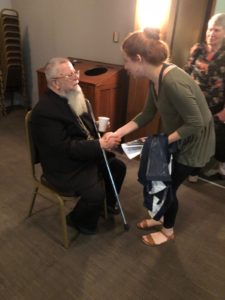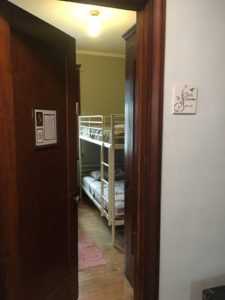Meeting Archbishop Elias Chacour
By Maddie Cox, Darst Staff 2018-2019

At 4 o'clock in the morning, I said goodbye to a mighty group of six from Manhattan College after spending six quality days on retreat together in May 2019. By the end of it, they had stolen my heart, and apparently enough to make me wake up at 3:45 a.m. to make sure they had a proper send-off from the Darst Center to begin their 14-hour trek home. As they drove off, I began to debate how I would now ease into a time of rest. After a few more hours of sleep, I last-minute decided to attend the 11 o'clock service at Fourth Presbyterian Church, where I've been worshiping for the past few months.
Without thinking much about it, I grabbed a bulletin and sat down next to my dear friend moments before the service started. I found my level of exhaustion made it hard to focus on what was happening throughout the service-- that was until it was time for the sermon.
I lifted my tired eyes up to the pulpit and was immediately curious as to the new face about to give this morning’s message. I squinted to take in his distinct features such as how his glasses sat carefully on this nose or how his beard was a sign of wisdom and respect. Without immediately recognizing him, I had to reference my bulletin for a quick bio. That's when my tired eyes widened and my jaw dropped when I read: Archbishop Elias Chacour.
He introduced himself as a storyteller and went on to do just that. As a Palestinian and a man from Galilee, he spoke with personal experiences to better paint biblical stories as a picture of what it was like for Jesus to do wonders in those cultural spaces. In response to the passage of Matthew 5:1-14 in which Jesus speaks of the Beatitudes and then goes on to address the crowd as the ‘salt’ and the ‘light,’ Elias shares his interpretation as a call to action to get our hands dirty in order to see change happen in our world. This was empowering, and yet I think what I appreciated the most was what he went on to warn us all of.
That shining our light can become an obstacle when our attempts in helping others become one of conversion or assimilation. Such an approach can become harmful when we undermine the importance of one another and our differences. Elias used the example of learning to be humble and love and accept all of Israel for its Jews, Muslims, and Christians. I then began to see this as an invitation to humble myself and love and uplift the Black, Latinx, Queer, immigrant, homeless members of my community. To do so, I, as a cis-gender, white woman, am learning to make space in places by listening to the voices of those often marginalized. From there, I can learn how to be of help rather than assume I know what’s best for benefitting from the dominant norm and, rather, challenge the larger systems at play. That then will lead me to a call to action as Elias pronounced.
If you'd like to hear it for yourself, you can access the MP3 version here.
Like most other Sundays, the preacher will stand right outside the sanctuary in the hallway to greet people after the service. Often times, a waiting line forms and without a doubt, Elias had quite the line of an eager, mostly older, crowd. I took my chance and hopped in that line with the intent to introduce him to The Br. David Darst Center.
During that brief moment we shared, I was able to give a short synopsis of what we do at the Darst Center and how we even have a room named after him. As some of you may know, each of the bedrooms at the Darst Center has a painted tile sign posted next to the door frame that commemorates a different social justice leader or activist.

Overall, it was an honor to speak with him for a brief moment, during which he blessed the Darst Center staff and the social justice work that we are doing. I was incredibly humbled in that moment and hold it very dear to my heart. I was delighted to share this exciting, motivating experience with the rest of the Darst Center staff, and now share it with all of you!
Thank you.
